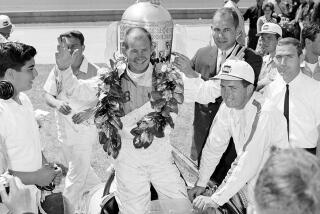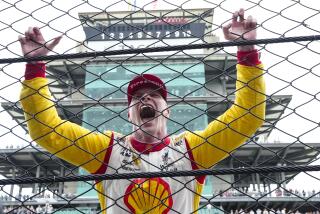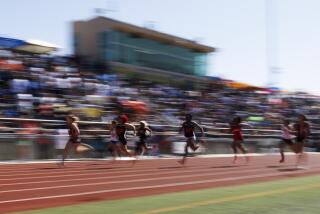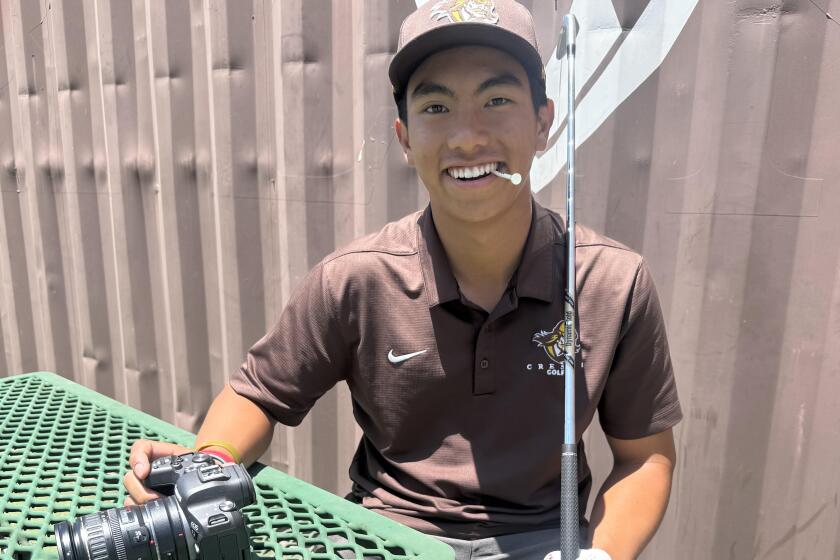A Breakaway Threat to Small Minds
- Share via
BLOOMINGTON, Ind. — Team Major Taylor was booed and sued and left sponsorless. For the last month Josh Weir, lead rider for Team Major Taylor, the fifth all-minority team to qualify for the Little 500, the cycling race immortalized in the 1979 movie “Breaking Away,” has heard himself called a cheater, a ringer, an outsider and some things that can’t be printed.
Upon introduction Saturday at Indiana University’s Bill Armstrong Stadium, in front of a crowd of nearly 20,000, the riders of Team Major Taylor were booed. After riding 197 laps, after being involved in a dramatic crash and still finishing ninth, the riders of Team Major Taylor were booed again.
And yet this day was a triumph for Team Major Taylor, a team named for an Indianapolis native, an African American cyclist who was setting world records in the early 1900s but who died penniless. It was a triumph for the Little 500, for Indiana University and for race relations.
For even while some drunken frat boys in the stands booed the Taylor team after the race, riders from four other teams came to Taylor’s pit area to pat Weir on the back or shake the hand of Coach Courtney Bishop.
Though extra police had been commissioned to patrol the stadium in response to rumors of trouble and threats against Team Major Taylor, there was no need. The race ran cleanly, the fans behaved, most of them, and the 33 racing teams were able to finish the race and shake hands.
In the stands behind Team Major Taylor were nearly 100 minority fans who chanted “We’ll be back,” and meant it.
“What we wanted to accomplish,” Bishop said, “was this. To bring new faces to this race and to this stadium. We did this for those people.” He pointed to the men, women, boys and girls who were wearing Team Major Taylor T-shirts and who never had found reason to come to this race in any of its previous 51 runnings.
“This wasn’t about winning but about opening doors and making an impact,” Bishop said. “I think we’ve done that. And we will be back.”
The last time an all-minority team competed, it finished last and was never a threat. That was in 1992 and one of the riders was Bishop, a New Yorker, an African American, a man proud of both his heritage and his school.
Ever since, Bishop, now an Indianapolis businessman, has dreamed of putting together another minority team, one that would be competitive and not only a token presence. With the Indiana Black Alumni Foundation raising money, Bishop went around the country recruiting the best minority cyclists he could find.
“It wasn’t hard to find them,” Bishop said. “It’s not a big pool.”
Bishop was able to offer the cyclists full scholarships to Indiana. In return, the cyclists had to commit to training hard for the Little 500.
Some of the recruits, like Rahsaan Bahati, a graduate of Crenshaw High, had already accomplished too much as amateur riders to be eligible for the race. So Bahati came to IU for the scholarship and to help train the racers.
Qualifying was in March. In something of an upset, Team Major Taylor, a team of four freshmen, qualified third out of 33 teams. The format of the race is like the Indy 500--11 rows of three teams. So Team Major Taylor had earned a front-row position and a month of trouble.
After qualifying, the Indiana University Student Foundation (IUSF), which runs the race, announced that Weir was ineligible. According to the IUSF, an anonymous complaint had been filed saying that Weir had at one time been classified a Category 1 rider by USA Cycling. To be eligible for the Little 500, cyclists had to be Category 3 or lower. According to the paperwork Weir filed, he was now a Category 3 racer.
Team Major Taylor and the IUSF agreed to abide by the decision of a three-person university arbitration panel. After reviewing the evidence, the arbitrators unanimously voted to allow Weir and Team Major Taylor to compete. A day after this decision was announced, the IUSF said it had received further information from USA Cycling that led it to believe Weir was ineligible.
University officials said the arbitration decision was final. Riders from other teams weren’t so quick to accept that answer. On Wednesday, during a final training run, and after the pace car had led the 33 teams around one lap, 32 teams laid down their bikes and refused to practice with Team Major Taylor.
Friday afternoon two riders--Kevin Vanes of Acacia fraternity and Todd Cornelius of Phi Gamma Delta--filed a lawsuit alleging Weir knowingly misled the arbitration panel about his previous riding experience and asked a judge to bar Weir from riding in Saturday’s race. A circuit judge dismissed the suit without a hearing after a single conversation with the plaintiff’s attorney.
Saturday morning McDonald’s, the sponsor of Team Major Taylor, withdrew its support. According to a person close to Team Major Taylor, McDonald’s said that if Weir raced, it would no longer be a sponsor.
McDonald’s representatives were unavailable but Team Major Taylor’s four riders had black masking tape covering up the “McDonald’s” on the front of their red racing jerseys.
“I believe I did everything by the rules,” Weir said after the race. “The IUSF had all my paperwork in August. Why was nothing questioned until after we did well in qualifying? I don’t want to say race was part of anything but you do have to wonder.”
Said Bahati: “Someone’s gonna make a movie about this.”
In a way, someone has.
“Breaking Away” was about the Cutters, a team of locals who loved bike racing and attended IU while living at home because they couldn’t afford to live on campus. The fraternities who had dominated the race did everything they could to keep the Cutters out of the Little 500. This being a movie, the Cutters fought their way in. And they’ve stayed. . They’ve won six times, and Cutter Coach Jim Kirkham, a rider on the winning 1992 Cutters team, was quick to find Bishop after the race.
“You make sure and come back next year,” Kirkham told Bishop. “Don’t let the controversy keep you out. Otherwise they win and you lose. I want to see you next year.”
Cherie Wardell, a senior and an executive director of the Central Black Student Union, said she and many African American students felt Weir had been unfairly scrutinized.
“Although riders have been disqualified before, Josh and Team Major Taylor were highly scrutinized because they performed so well at qualifications. Some felt threatened by their presence and wanted to find ways to eliminate the entire team,” Wardell said. She said the fact the IUSF refused to abide by the original decision of the arbitration panel was evidence that race was an issue.
Alex Ihnen, head of the IUSF, said that in the last seven years 13 cyclists had been ruled ineligible to compete. “Every year we have 10 or 15 people we have questions about. We do checks to make sure everyone is being honest,” he said.
Ihnen said he wouldn’t comment on Weir’s participation. He did say he fully supported the decision last Wednesday of 32 teams to lay down their bikes and not ride the practice laps. “When you take a group of 19-, 20-, 21-year-old guys and get that many to agree on a particular issue, that says something about the issue,” Ihnen said.
As Team Major Taylor accepted congratulations from some of its fans and took photos with Miss IU, two members of another team walked by. One said to the other, “Bet they won’t be back. They won’t get away with cheating next year.”
“But we will be back and we’ll be better,” Bishop said.
“Mark my words,” Kirkham said. “If Team Major Taylor keeps coming back, it’s going to win this thing. And won’t that be something?”
*
Diane Pucin can be reached at diane.pucin@latimes.com
More to Read
Go beyond the scoreboard
Get the latest on L.A.'s teams in the daily Sports Report newsletter.
You may occasionally receive promotional content from the Los Angeles Times.










